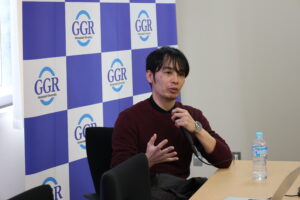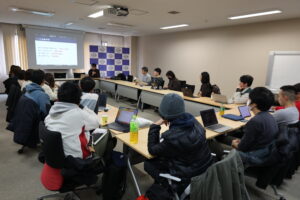On January 22, 2024, the Institute for Global Governance Research (GGR) at Hitotsubashi University hosted the 24th GGR Brown Bag Lunch Seminar titled “The Dictator’s Dilemma at the Ballot Box: Electoral Manipulation, Economic Maneuvering, and Political Order in Autocracies” featuring Dr. Masaaki Higashijima (Associate Professor, Institute of Social Science, University of Tokyo) as the speaker.
Dr. Higashijima first introduced the definition of a political system as “the rules that determine who influences the choice of political leaders” and explained the respective definitions, classifications and characteristics of democracy and authoritarianism. He noted that democracy possesses four characteristics: the head of the executive branch is elected; there are alternatives available; competition is free and fair; and citizens are guaranteed the right to vote. In contrast, authoritarianism lacks some of these characteristics. He went on to illustrate the diversity of authoritarianism by focusing on the elements that are missing, with elections at the center. The discussion centered around how dictators mitigate the dilemma between ‘credibility of election results’ and ‘certainty of electoral victory,’ specifically through electoral manipulation and economic manipulation, using Kazakhstan and Kyrgyzstan as examples. It was concluded that contemporary authoritarianism tends to maintain power through less obvious means, such as economic redistribution and changing electoral rules, rather than through the “use of force.”
During the Q&A session, questions were raised about the differences in electoral fraud across various forms of dictatorship, the causes of electoral manipulation failures, and changes to Hong Kong’s electoral system. Dr. Higashijima explained that in the case of military dictatorships, there is less potential for fraud due to inadequate organization, whereas in institutional dictatorships, the potential for fraud increases when resources are limited.
【Event report prepared by】
YAN Feng (Master’s student, Graduate School of Law, Hitotsubashi University)


